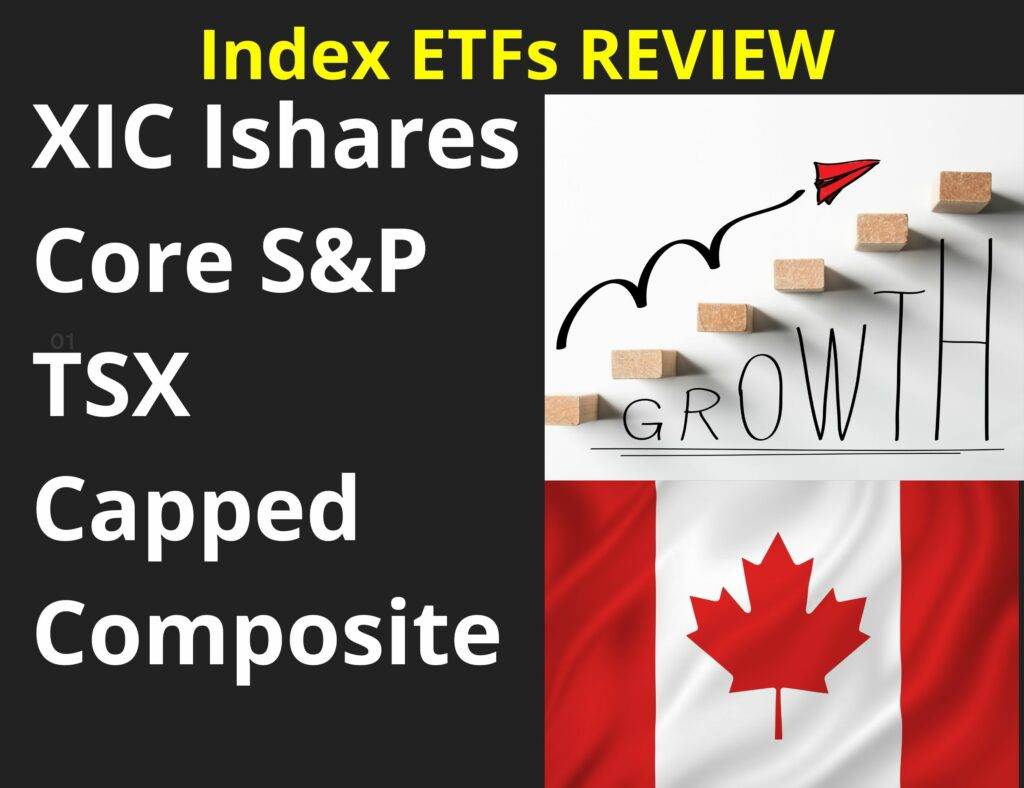In this post, we will review a popular index ETF on the TSX: the Ishares Core S&P TSX Capped Composite (XIC Stock). We will first explain what’s an index ETF. Then, we will discuss XIC’s historical performance, fees and holdings. Finally, we will compare XIC against similar ETFs.
[stock_market_widget type=”card” template=”basic” color=”#5679FF” assets=”XIC.TO” display_currency_symbol=”true” api=”yf”]
[stock_market_widget type=”chart” template=”line” color=”#5679FF” assets=”XIC.TO” range=”1mo” interval=”1d” axes=”true” cursor=”true” range_selector=”true” display_currency_symbol=”true” api=”yf”]
Updated daily – XIC Stock
Best Canadian dividend ETF 2023- Top 16
What’s an index ETF
There are several types of ETFs. Index ETFs are the king of the hill. The first-ever ETF introduced to a North American Exchange was an index ETF. Index ETFs offer exposure to many securities and sometimes to a whole stock exchange at a meager cost. Their main goal is to acquire, on your behalf, all the securities that constitute a specific index to achieve the same return of the tracked index minus the fees.
Advantage of Index ETFs
One significant advantage of owning an index ETF is low fees. The manager is simply replicating the index’s performance either by acquiring directly or indirectly (using derivatives) the constituents of the index. There is no additional effort involved in the selection process, thus no need to generously compensate the portfolio manager.
Does an index ETF pay dividend?
Yes they do. Since Index ETFs holds all shares of companies part of the index, if these companies pay dividends then a dividend will be distributed. See below the performance table, the dividend yield is included.
Index definition
S&P/TSX Capped Composite Index (Index)
includes over 200 top-ranked Canadian stocks, representing approximately 95% of the Canadian equity market. Constituent securities must pass minimum float-adjusted and liquidity screens to qualify and maintain membership in the Index. Index weights are capped at 10% of the Index’s float-adjusted market capitalization and are reviewed quarterly.
VEQT review: Vanguard All-Equity ETF Portfolio
Best ETF Canada: Top 7 offered by BMO
S&P/TSX 60
An index constituted of the 60 largest companies in the Toronto Stock Exchange
XIC Stock Investment objective
Seeks long-term capital growth by replicating the performance of the S&P®/TSX® Capped Composite Index, net of expenses. XIC invests in 219 Canadian companies. XIC has a very low MER 0.06% in comparison to XIU at 0.18%.
The Ishares Core S&P TSX Capped Composite ETF is dominated by Energy and Financial companies.
XIC Stock historical performance
[stock_market_widget type=”table-quotes” template=”color-text” color=”#0D37F2″ assets=”XIU.TO,XIC.TO,ZCN.TO,HXT.TO,VCN.TO” fields=”symbol,ytd_return,three_year_average_return,five_year_average_return” links=”{‘XIU.TO’:{},’XIC.TO’:{},’ZCN.TO’:{},’HXT.TO’:{},’VCN.TO’:{}}” display_header=”true” display_chart=”false” display_currency_symbol=”true” pagination=”true” search=”false” rows_per_page=”5″ sort_field=”logo_name_symbol” sort_direction=”asc” alignment=”left” api=”yf”]
Updated daily – XIC Stock
XIC Stock Holdings
| Name | Weight % |
| ROYAL BANK OF CANADA | 6,24 |
| SHOPIFY SUBORDINATE VOTING INC CLA | 5,79 |
| TORONTO DOMINION | 5,55 |
| BANK OF NOVA SCOTIA | 3,42 |
| ENBRIDGE INC | 3,36 |
| CANADIAN NATIONAL RAILWAY | 3,31 |
| BROOKFIELD ASSET MANAGEMENT INC CL | 2,95 |
| BANK OF MONTREAL | 2,89 |
| CANADIAN IMPERIAL BANK OF COMMERCE | 2,26 |
| CANADIAN PACIFIC RAILWAY LTD | 2,24 |
Please consult issuers’ website for up-to-date data
XIC Sector allocation
| Secteur | Poids % |
| Finance | 31,61 |
| Énergie | 13,07 |
| Matières | 12,58 |
| Valeurs industrielles | 11,44 |
| Technologie de l’information | 9,55 |
| COMMUNICATION | 4,93 |
| Services publics | 4,54 |
| Consommation discrétionnaire | 3,92 |
| Biens de consommation de base | 3,60 |
| Immobilier | 3,15 |
Please consult issuers’ website for up-to-date data
How to pick the Best ETF that fits your need?
Diversification
The purpose of diversification is to minimize risk. XIC stock is the most diversified index ETFs with over 200 holdings. Next comes XIU with 60 holdings.
Taxation
Both XIC and XIU distribute taxable Canadian dividends. There is no difference in terms of tax impact.
If you are looking for an ETF that tracks the S&P60 index with no dividend distribution, then take a look at HXT. The latter is structured so that all income distributions are deferred. No dividend distribution means no tax.
Liquidity
There are two aspects to consider:
liquidity of holdings: XIU comes on top as its holdings are made up of the 60 largest Canadian companies listed on the Toronto Stock Exchange;
the liquidity of the ETF (average difference between the price ‘Bid’ and ‘Ask’ or what is commonly called the ‘spread’): Both XIU and XIC offer great liquidity.
How can I buy an index ETF?
It’s the same process as buying a stock. You need simply to access the online website of your broker and place the order using the ticker/symbol of the ETF
Who are the main issues of ETFs in Canada?
- BMO Asset Management
- Claymore Investments
- BlackRock Inc (iShares)
- Horizons ETFs Management
- Vanguard Investments Canada Inc.
Why should I consider buying an index ETF?
The quick answer is diversification. Assume you have 5,000 $, you can’t buy a lot of stocks with that amount (may be 4 or 5). Also, you will incur fees to trade them. Your portfolio will be certainly too dependent on a performance of 1, 2 …or even 5 sectors that your stocks are in. If you buy with that 5,000 $ an ETF that tracks let’s say the TSX/S&P 60, it basically means you just bought share in 60 of the largest companies that are trading in the stock exchange in Canada. It’s clearly a powerful tool to diversify your portfolio with a small amount of money.

